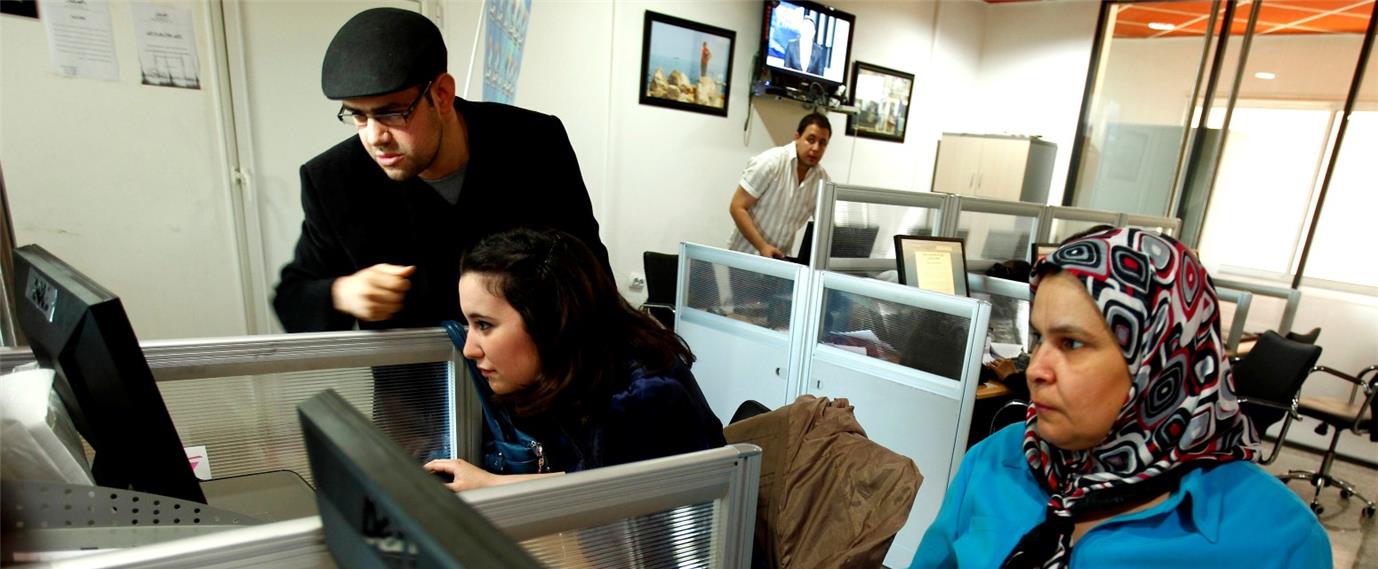هذا سؤال قديم، طرح مباشرة بعد ظهور ما عرف بصحافة الويب في النصف الأول من تسعينات القرن الماضي. وأول من حاول الإجابة عليه جاكوب نيليسن الاسم الأبرز في مجال دراسات استخدام الإنترنت. وما نعنيه بالكتابة هنا معنى شامل ومجموعة عمليات تقود في النهاية إلى إنتاج محتوى رقمي مميز عبر استخدام الكلمات والصور الثابتة والمتحركة والصوت.
في عام 1997 توصل نيليسن إلى النتيجة التالية: " زوار المواقع لا يقرأون النصوص المنشورة كلمة بكلمة، وبدلا من ذلك فإنهم يمسحون الصفحة وبسرعة بحثا عن العناصر البارزة". (1).
إن الكتابة الجيدة للصحافة الرقمية أو صحافة الإنترنت تعتمد بشكل أساسي على ما يعرف بالاقتصاد في اللغة، وهو ما يعبر عنه بمقولة" ما قل ودل" وهو مبدأ تحتمه طبيعة الإنترنت كوسيلة، وكذلك نوعية الجمهور المستهلك لمحتوى الصحافة الرقمية.
الاقتصاد في اللغة مبدأ مطلوب في الكتابة لجميع وسائل الاتصال، ذلك أن المساحة في الصحف تقتضي ذلك، وكذلك الحال بالنسبة للزمن الممنوح لخبر معين في الإذاعة أو التلفزيون. أما بالنسبة للإنترنت فإن الاقتصاد تحتمه طبيعة الوسيلة، حيث أثبتت العديد من الدراسات صعوبة القراءة من على شاشة الكمبيوتر، ونشير هنا إلى إحدى دراسات جاكوب نيلسون عام 2000 التي وجدت أن القراءة من على شاشات الكمبيوتر أبطأ بنسبة 25% مقارنة بالقراءة من الصحف.
لقد صدرت العديد من الدراسات في هذا الخصوص، كما أن العديد مما يعرف بأدلة التحرير الصادرة من مختلف المؤسسات الإعلامية الكبرى حرصت على وضع أسس واضحة لكتابة النصوص الخاصة بالصحافة الرقمية.
ومعظم هذه الموجهات تركز بشكل أساسي على ضرورة الاختصار عند الكتابة لصحافة الإنترنت، والاختصار المقصود هنا ليس مجرد تقليل عدد كلمات النص فحسب، وإنما المقصود به أن يكون التركيز منصبا في الأساس على التكثيف المفيد للزائر حتى يوافي ويوافق قول الشاعر:
وخير الكلام قليل الحروف .. كثير القطوف بليغ الأثر.
ويقترح جون موركس وجاكوب نيلسن أسلوبا للكتابة يتكئ بشكل رئيسي على نتائج دراساتهما المشار إليها أعلاه، ويمكن إجمال ما يوصيان به في النقاط التالية:
- يجب أن تحتوي الفقرة الواحدة على فكرة أساسية واحدة، وتقدم حجم المعلومات المناسب دون زيادة أو نقصان.
- ترتيب المعلومات، والبساطة والوضوح في عرض الأفكار، بعيدا عن التعقيدات اللفظية ليصبح المحتوى في متناول الجميع على اختلاف مستوياتهم واهتماماتهم. وقد عبرا عن ذلك بعبارة (Put it into more down – to –the earth language). النص بكامله يجب أن يكون قصيرا ومجزأ، إذ أن من يقرؤون الأخبار على الشاشة يحبذون الاختصار والكتابة بطريقة الهرم المقلوب التي تبدأ بالأكثر أهمية ثم الأهم فالمهم فالأقل أهمية.
الكلمات في صحافة الإنترنت:
إن كل كلمة ترد في القصة الخبرية يجب أن يكون هناك مبرر لوجودها، وعليه يجب اتباع الآتي عند اختيار الكلمات:
- عدم استخدام كلمات أكثر مما تقتضي الحاجة.
- تجنب الكلمات الطويلة إذا كانت البدائل القصيرة تفي بالغرض.
- تجنب الكلمات ذات المعاني المركبة إذا توفرت أخرى ذات معنى واضح وبسيط.
- استخدم الكلمات التي تعطي معنى واضحا، وليس التي تعطى معنى تجريديا كلما كان ذلك ممكنا.
- احرص على أن تكون الكلمات واضحة ومحددة وليس مجرد عموميات.
- أعط الكلمات معناها الصحيح.
بناء الجمل في الكتابة لصحافة الإنترنت:
- تعتبر المباشرة من أهم قواعد صياغة الجمل في صحافة الإنترنت، ويدعو الباحثون في هذا الشأن إلى ضرورة اتباع البناء الذي يبدأ بالفعل والفاعل والمفعول به، فيفضل أن نكتب(قتل الجيش الأميركي أكثر من 70 مدنيا في أفغانستان) وليس (المدنيون الأفغان قتلوا بواسطة نيران الجيش الأميركي). ويرى الصحفي البريطاني مايك وارد الذي أشرف على موقع بي بي سي بداية إنشائه أن القاعدة الذهبية للهروب من الجمل الطويلة هو أن نجعل كل جملة تقدم فكرة أو معلومة محددة، طبعا مع مراعاة ألا يكون النص بكامله عبارة عن جمل قصيرة.
- يجب أن تحتوي الجمل على علامات الترقيم الصحيحة، والتي يجب أن تستخدم في مكانها تماما، فالجملة قد تكون مربكة، أو ربما غير مفهومة تماما إذا كُتبت دون علامات ترقيم.
- يجب ملاحظة أن الاستخدام المتكرر للصفات والأفعال المساعدة قد يعطي نتيجة عكسية، وكما أشار أحد العاملين في المجال فإن إغراق الجمل ببهارات الصفات والأفعال المساعدة لن يحسن كثيرا من النكهة الأصلية، وعليه فإن التعبير عن حقائق القصة الخبرية بالوضوح والمباشرة سيقدم لقارئها الفكرة كاملة دون لبس.
- تجنب الاستخدام المفرط للكليشيهات (العبارات الجاهزة) فهي قد تكون متعبة وتافهة، ما لم تدعو الضرورة لذلك، خاصة إذا كان النص موجها لقارئ لا يدرك تلك العبارات.
- تجنب الحشو كلما كان ذلك ممكنا، فليس بالضرورة أن تورد جملتين للتعبير عن معنى واحد حتى تضمن وصول الرسالة للقارئ.
- يجب عدم اللجوء إلى اللغة التخصصية ( جارغون) ولغة الدواوين والرسميات، وهذا الأمر لن يستعصى على الصحفي الذي يجب عليه أن يكتشف ما تعنيه الكلمات التخصصية وبالتالي يصيغه في لغة واضحة لقارئ النص. ويقع كثير من الصحفيين الذين يعملون في وسائل الإعلام التي تتجه برسالتها للقطاع العريض من الناس في مأزق استخدام اللغة التخصصية في قصصهم الإخبارية، مرة بمبرر ضغط العمل وفي مرات كثيرة بسبب الكسل في البحث عن المعنى المباشر الذي يجب أن يقدم للقراء بدلا عن إدخالهم في حيرة البحث بأنفسهم عن المعنى المراد. وأشنع من ذلك أن يكون الصحفي جاهلا بما يعنيه المصطلح التخصصي الوارد في قصته فيلجأ إلى وضعه كما هو، وهذا ما يسمى ب"خطيئة الكاردينال".
- يجب استخدام الاقتباس على نحو ملائم، وإلا فعلى الصحفي أن يلخص الاقتباس بلغته هو، كما يجب أن يكون استخدام الاقتباس بهدف نقل إحساس معين أو معلومات محورية في تطور القصة.
في النسخة الأخيرة من الدليل التحريري الخاص بمؤسس ياهو والذي يركز بالأساس على الكتابة والتحرير وإنتاج المحتوى الرقمي، ثمة تركيز على ضرورة أن يتعرف الكاتب وبشكل مفصل على جمهور الأونلاين وخصائصه. وهذه المعرفة هي التي تتيح لكاتب النصوص الخاصة بالصحافة الرقمية ولمنتجي المحتوى الرقمي عامة أن يخرج بمادة تتوافق مع طبيعة هذا الجمهور، ويتحقق فيها ما أشرنا إليه في صدر المقال.
هامش
(1) https://www.nngroup.com/articles/concise-scannable-and-objective-how-to…








































